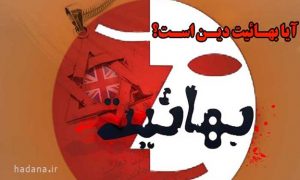In order to provide facilities for accepting Hussein Ali Mirza’s-(Baha) prophethood, the Baha’is try to include Ali Muhammad Bab as the prophet of God who has been sent for prophetic mission by God after the Excellency holy prophet (P.H.) and invited people of the world to a new religion. The followers
of the made creed of Bahaism are claiming for Bab to have two positions:
۱) An independent prophet owning the book!
۲) evangelizing the emergence of another prophet called Mirza Hussein Ali Nouri. So, the Islamic religious law was cancelled by the emergence of Bab and Baha and an independent religious law and a new creed called Bahaism has been created!
Criticism and investigation
The claiming for new prophethood by Bahaism and the abolishment of the Islamic religious law have been null in various perspectives having the following basic problems:
The contradictory claims
The contradictory claims by Ali Muhammad Bab-in the field of having relationship with Imam of the Time (P. H.), Mahdism, prophethood, and divinity- and Mirza Hussein Ali Nouri – such as the one whom God will manifest, Mahdism, prophethood, and divinity – the contradictions and inner conflicts of teachings, incompatibility with logic and wisdom, the existence of various errors and mistakes in the books, tablets and letters , and the lack of miracle for proving prophethood[1], inability to answer the questions and to debate with the scholar and finally denying claims repeatedly and writing the letter of repentance by Bab are of the clear falsehood of such claims; which are in compatible with the logic and method of the prophets and the principles of the divine religions completely.[2]
Scandals in Debates
According to the historical documents, Bab directly debated with his contemporary scholars in Shiraz, Isfahan and Tabriz. After failure, he turned to asking for forgiveness and denial; as confessed by Hussein Yazdi- the writer and assistant of Bab- Ali Muhammad Bab denies all of his claims on pulpit of Vakil mosque, Shiraz in the presence of scholars and people and says specified by Nabil Zarandi, the Baha’i known writer: Damn on whom he/she calls me the gate for Imam.” [3]
After that he turned against his claims for Babism and being the deputy for Imam of the Time (May God hasten his reappearance) after specifying the eternality of Islamic commandments. In Isfahan, Bab evaded answering the scientific questions of the scholars of Isfahan![4] In Tabriz, Bab was first trying to attract the people of that land to himself and he was to some extent successful, but the depth of his ignorance became clear and the scholar and people of Tabriz opposed him after debating with him and Bab’s inability in defending his beliefs and claims and answering scholars’ questions.
Bab’s letter of repentance
The original copy of Bab’s letter of repentance is existent in the library of the Islamic council parliament. Confessed by Fadhlullah Mohtadi- the secretary and writer of Abbas Effendi who turned against Bahaism later on-Babis and Baha’is didn’t want it to be dispersed among people in order for people not to know that Seyyed Bas has turned against his words and statements[5] “ and for this reason, they have always tried to steal the original document using various methods to vanish it.[6]
So, Ali Muhammad Shirazi denied all of his claims like the other false prophets by a single trivial punishment. An issue which hasn’t been existent in the divine prophets’ methods of life at all. This is a clear reason for the falsehood of Bab’s claims.
[۱] It is interesting to be noted that according to Baha’ism view, Bahaullah himself is a miracle because he hadn’t gone to school! And was able to write tablets in English and Arabic languages!
[۲] Refer to the previous Baha’is
[۳] In this regard refer to the Baha’i sources: The summary of Nabil Zarandi’s history, translated by Ishraq Khawari, the national assembly of the faith works, Tehran 1325 S.H., – 1329, p. 103; Badi’a, p.138.
[۴] Jem magazine, year: 5, No. 7, Mehr 1356 S.H., p. 501 on, Master Mohit’s article, about Bab and the scholars of Isfahan, and criticizing statements of Baha’i sources.
[۵] Documents about Bahaism (second volume of Sobhi’s memoirs), printed by Seyyed Hadi Khorramshahi, p.97
[۶] Refer to the book “the Baha’s”, previous, p.224






